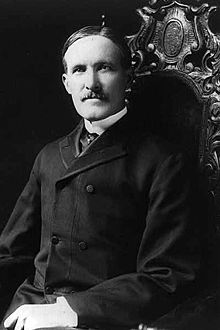Bernard Shandon Rodey
| Bernard Shandon Rodey | |
|---|---|
 |
|
| U.S. Attorney for the 2nd Division of Alaska | |
|
In office 1910–1913 |
|
| Judge for the U.S. District Court for the District of Puerto Rico | |
|
In office 1906–1910 |
|
| Member of the U.S. House of Representatives from New Mexico Territory's At-large district |
|
|
In office March 4, 1901 – March 3, 1905 Delegate |
|
| Preceded by | Pedro Perea |
| Succeeded by | William H. Andrews |
| Personal details | |
| Born | March 1, 1856 County Mayo, Ireland |
| Died | March 10, 1927 (aged 71) Albuquerque, New Mexico |
| Political party | Republican |
| Alma mater | Harvard University |
| Occupation | lawyer, politician |
Bernard Shandon Rodey (March 1, 1856 – March 10, 1927), Irish-American politician who was a Delegate from the New Mexico Territory and later a federal judge in Puerto Rico.
Rodey was born in County Mayo, Ireland. He emigrated with his parents in 1862 to Canada, and was educated in Sherbrooke, Quebec. After leaving Canada, he went to Massachusetts where he studied law at Harvard University. Rodey moved to Albuquerque, New Mexico in 1881 where he became employed as a private secretary for the Atlantic and Pacific Railroad Company. He left the railroad to practice law and was admitted to the bar in 1883. Active in politics from a young age, Bernard was elected to the territorial senate representing Bernalillo County in 1889. He introduced legislation to create the University of New Mexico. The bill detailed the acquisition of funds and land for the institution, locating its construction in New Albuquerque. Passage of the bill on February 28, 1889 earned Rodey the title "Father of the University" and Rodey Hall was named in his honor.
In 1900 Rodey was elected as a Republican to the U.S. House of Representatives as a Delegate from the New Mexico Territory. During his two terms in office, he was best known for his unrelenting fight to gain statehood not only for New Mexico, but Arizona and Oklahoma as well. He fought against a consortium of Eastern senators led by Albert J. Beveridge of Indiana that was threatened by the admission of Western territories as states. Rodey was defeated in a primary fight against William Henry Andrews in 1904.
...
Wikipedia
